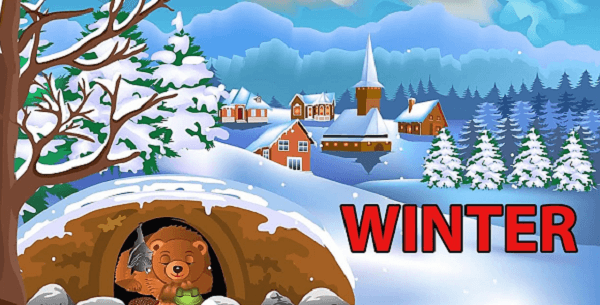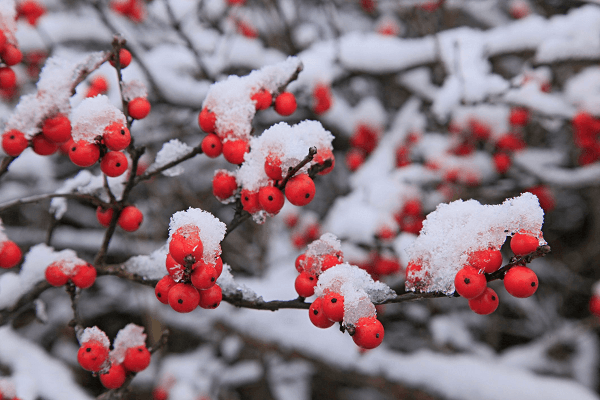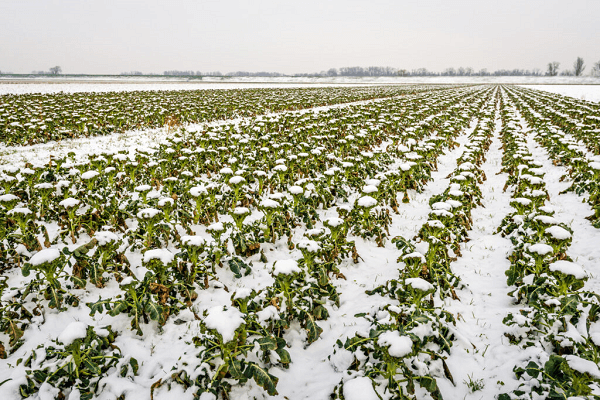Winter SeasonWinter is the coldest season of the year, which usually starts in December and lasts till February or March in most parts of the world. It is a season characterized by a temperature drop, cold winds, and shorter days. Different aspects of the economy, the ecology, and the human race are affected differently by winter. In India, winter is relatively milder compared to other parts of the world. 
Impacts of Winter Season
Winter season affects agriculture in different ways. It can lead to reduced crop yields due to low temperatures and frost, particularly for crops that are sensitive to cold weather. On the other hand, winter is essential for some crops, such as wheat and barley, which require a period of cold weather to grow properly. The winter season also provides an opportunity for farmers to carry out tasks such as pruning, harvesting, and preparing the land for the next planting season.
The winter season has both positive and negative impacts on human health. On the positive side, cold weather can reduce inflammation and pain in joints and muscles, improving overall health. On the negative side, winter is associated with respiratory illnesses such as flu, bronchitis, and pneumonia, which can be severe and life-threatening, particularly for vulnerable populations such as the elderly, children, and those with weak immune systems.
Winter season affects transportation in many ways. Cold weather can cause roads to become icy and slippery, leading to accidents and traffic congestion. Snow and ice can also disrupt air travel, leading to flight cancellations and delays. In addition, winter weather can also impact public transportation, leading to delays and cancellations of ticket bookings, particularly in areas that experience heavy snowfall.
Winter season is associated with increased energy consumption, particularly for heating purposes. As temperatures drop, people use more energy to heat their homes and workplaces, leading to increased energy bills. This increased demand for energy can also lead to power outages and energy shortages, particularly in areas with inadequate infrastructure.
The winter season can be a boon for the tourism industry in areas that experience heavy snowfall. Winter sports such as skiing, snowboarding, and ice skating attract tourists worldwide, contributing significantly to the local economy. However, winter can also lead to reduced tourism in areas that experience extremely cold weather or heavy snowfall, as people tend to avoid traveling in such conditions. Winter Season in India
India is a diverse country with varying climatic conditions. In general, winter in India is milder compared to other parts of the world, with temperatures ranging from 10°C to 20°C in most parts of the country. However, some regions experience extremely cold weather, particularly in the country's northern parts, where temperatures can drop to sub-zero levels.
The winter season in India is associated with several festivals and celebrations. The most prominent of these is Diwali, the festival of lights, which is celebrated in October or November. Other winter festivals include Christmas, New Year, Lohri, Pongal, and Makar Sankranti, which are celebrated across different parts of the country.
Winter season in India is a crucial period for agriculture, particularly for crops such as wheat, barley, and mustard. Winter crops contribute significantly to the country's agricultural production and are vital to food security.
Winter season in India is a popular time for tourists, particularly in regions that experience milder weather conditions. Popular tourist destinations during winter include Goa, Rajasthan, Kerala, and Tamil Nadu, which offer a range of activities such as beach holidays, wildlife safaris, and cultural tours.
Winter season in India can also have an impact on human health. While the temperatures are generally milder, colder regions such as the northern states can experience extreme cold, which can be detrimental to health, particularly for vulnerable populations such as older adults and children. In addition, winter in India is associated with increased air pollution, which can lead to respiratory illnesses. Moreover, climate change affects the winter season in various parts of the world, including India. The changing weather patterns have led to unpredictable and extreme weather conditions, such as prolonged cold spells, unseasonal rainfall, and hailstorms. These conditions can have significant impacts on agriculture, transportation, and human health, among others. Therefore, it is essential to take appropriate measures to adapt to the changing climate and mitigate the impacts of the winter season on various sectors of the economy. Types of Vegetation Found in Winter SeasonLow temperatures, frosty weather, and shorter daylight hours characterize winter. However, despite these unfavorable weather conditions, several plants thrive during this season, providing food and shelter to wildlife. Some notable vegetation includes: 
One of the most prevalent types of vegetation during the winter is evergreen trees. As a result, they serve as a crucial wintertime source of both food and shelter for wildlife. Evergreen trees such as pine, spruce, and fir provide a home for birds, squirrels, and other small animals. Additionally, these trees also act as windbreaks, helping to protect other plants from the harsh winter winds.
Winter berries are a type of fruit that ripens in the fall and remains on the plant throughout the winter season. These berries are an important food source for birds and other wildlife during winter. Examples of winter berries include holly berries, winterberry, and crabapples.
Although winter is not known for its abundance of flowers, there are some plants that bloom during the winter season. Examples of winter flowers include the Christmas rose and the winter aconite. These plants are adapted to the colder temperatures and shorter daylight hours of the winter season, and their flowers provide important nectar for bees and other pollinators.
Although most garden vegetables are grown during the summer, some types of vegetables can be grown during the winter. Examples of winter vegetables include kale, collard greens, and Brussels sprouts. These vegetables are adapted to the colder temperatures and shorter daylight hours of the winter season, and they provide important nutrients for humans and wildlife alike. Best Crops to Grow in Winter SeasonWinter season is a time when most people prefer to stay indoors and enjoy the cozy warmth. We can also take advantage of the copious supply of freshly picked produce at this time. The winter season is a great time to explore the different types of fruits and vegetables that are available in the market. Here are some of the types of fruits and vegetables found in the winter season: 
Citrus fruits are a great source of Vitamin C which helps in boosting our immune system. Oranges, lemons, grapefruits, tangerines, and limes are just a few of the citrus fruits that are readily accessible in the winter. These fruits are not only delicious but also have many health benefits. In addition to lowering the risk of heart-related diseases, they also aid in the prevention of the common cold and the flu.
Apples are one of the most popular fruits available in the winter season. They have antioxidants that assist in avoiding chronic diseases, and they are also an excellent supply of fiber and vitamin C. Apples come in different varieties like Red Delicious, Granny Smith, and Golden Delicious, each with its unique flavor and texture.
Another well-liked fruit that is readily accessible in the wintertime is pears. They are a good source of dietary fiber and Vitamin C. Pears are available in different varieties like Bartlett, Anjou, and Bosc, each with its unique taste and texture.
During the winter months, a variety of veggies are harvested, including winter squash. They are an excellent way to obtain fiber, potassium, and vitamin A. Butternut, acorn, and spaghetti squashes are a few of the popular winter squash categories. Winter squash can be roasted, mashed, or used in soups and stews.
Root vegetables are a group of vegetables that are available in the winter season. Root vegetables like carrots, beets, turnips, parsnips, and rutabaga are some of the most well-liked varieties.
Cabbage is a vegetable that is available in the winter season. It has tremendous amounts of dietary fiber, Vitamin C, and Vitamin K. Cabbage can be eaten raw or cooked and is used in dishes like coleslaw, sauerkraut, and stir-fry.
Brussels sprouts are also a good source of dietary fiber, Vitamin C, and Vitamin K. The Netherlands is the country where Brussels sprouts are grown the most. Brussels sprouts can be roasted, sautéed, or used in soups and stews.
Kale and broccoli are green vegetables that are available in the winter season. China and USA are the largest cultivators of kale worldwide. Both (kale and broccoli) can be eaten raw or cooked and are used in dishes like salads, smoothies, and soups.
Cauliflower is a vegetable that is available in the winter season. China is the largest production house of this vegetable. Cauliflower can be eaten raw or cooked. It is used in dishes like roasted cauliflower, cauliflower rice, and soups. Best Countries to Visit in Winter SeasonWinter season is one of the most amazing seasons of the year. It brings the joy of Christmas and snowfall, which makes everything look more serene and pure. But only some countries are suitable for a winter vacation, especially when you want to experience the best of winter sports, snowy landscapes, and festive traditions. One can visit the following countries during the winter season:
Switzerland is a winter wonderland with its snow-capped peaks, pristine alpine lakes, and picturesque ski resorts. The country is known for its stunning natural beauty and charming towns that are a delight to explore during winter. Some of the most well-known winter sports destinations in the world, including Verbier, St. Moritz, and Zermatt, are located in Switzerland. Switzerland is also famous for its Christmas markets, where you can shop for unique gifts and sample traditional Swiss cuisine.
Japan is a fantastic destination to visit during the winter season, with its snow-capped mountains, hot springs, and unique winter festivals. There are many ski resorts in the nation, including Niseko, Hakuba, and Shiga Kogen. Japan is famous for its winter festivals, such as the Sapporo Snow Festival, which showcases incredible ice sculptures and attracts visitors from all over the world.
Austria is another popular destination for winter vacations, with its picturesque alpine villages, world-class ski resorts, and charming Christmas markets. Austria is famous for its après-ski scene, where you can enjoy live music, hot drinks, and traditional Austrian cuisine. In addition to winter sports, Austria is known for its festive traditions, including Christmas markets, where you can shop for unique gifts and try delicious holiday treats.
Canada is a great destination for winter vacations, with its stunning natural beauty, excellent ski resorts, and vibrant winter festivals. Canada is famous for its winter festivals, such as the Quebec Winter Carnival, which features ice sculptures, parades, and traditional French-Canadian cuisine. In addition to winter sports and festivals, Canada is known for its beautiful natural landscapes, such as the Canadian Rockies, which are particularly breathtaking during the winter months.
Norway is a beautiful country to visit during winter, with its snowy landscapes and unique winter activities. Norway is famous for its Northern Lights, which are particularly visible during the winter months. In addition to winter sports and the Northern Lights, Norway is known for its unique winter activities, such as dog sledding, reindeer sleigh rides, and ice fishing.
Finland is a magical destination to visit during the winter season, with its snow-covered forests, frozen lakes, and unique winter activities. Along with its distinctive winter sports, Finland is well known for its snowmobile, reindeer safaris, and husky sledding. One of Finland's most popular winter attractions is the opportunity to witness the Northern Lights, which can be seen in various parts of the country.
Germany is a popular destination for winter vacations, with its charming Christmas markets, historic towns, and winter sports facilities. Germany is well-known for its Christmas marketplaces, which take place in towns and cities all throughout the nation and provide tourists the chance to browse for one-of-a-kind items, partake in traditional German fare and beverages, and take in the festive mood. ConclusionThe winter season has a variety of effects on individuals, the surroundings, and different economic sectors. While it can be a time of joy and celebration, it can also bring with it challenges, such as health issues, disruptions to transportation, and increased energy consumption. In India, winter is relatively milder compared to other parts of the world, and it is a crucial period for agriculture and tourism. While the winter season brings with it its unique set of challenges, it is a season that is essential for the environment and plays a vital role in various sectors of the economy. It is crucial to take appropriate measures to mitigate the negative impacts of the winter season and take advantage of the opportunities it presents.
Next TopicHow to Save Videos from VLC
|
 For Videos Join Our Youtube Channel: Join Now
For Videos Join Our Youtube Channel: Join Now
Feedback
- Send your Feedback to [email protected]
Help Others, Please Share










